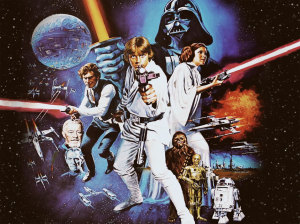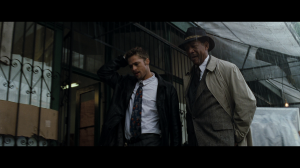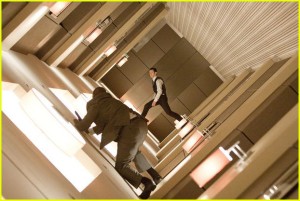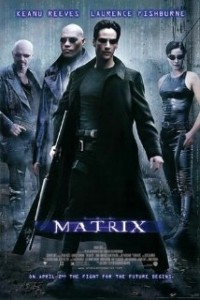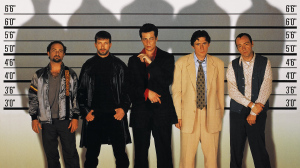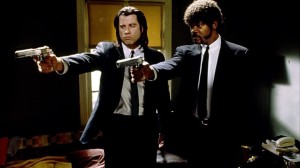Everyone loves lists. Top Tens, Billboard Top 200, Bottom Ten, Top 100, etc. It is inherent and ingrained in our human nature to take the chaos around us and put it in some sort of orderly fashion. Every Tuesday, Josh lists his Top 5 movies based on an actor, genre, director, theme, holiday, sandwich or general whimsy and posts it for your consumption and discussion. If you want to submit your own list you can email Josh at J.A.Crabb22@gmail.com with the subject line, “RWT Top 5 Tuesday”, give a short 50-100 word description of the theme and your choices, you could end up seeing your list right here!
TOP 5 TUESDAY – BEST MOVIES WITH ORIGINAL SCREENPLAYS
The next chapter in The Hunger Games trilogy has already premiered and is in wide release this Friday. Many, many avid readers and fans of the movies are surely already standing in line for the midnight premiere. I, for one, am excited also, as this is one of the only movie franchises I can get my wonderful wife and best friend, Tina, to go with me to the movie theater. We are eagerly re-reading the books by Suzanne Collins and getting ready to go see this together by watching Catching Fire, my favorite book of the trilogy and my favorite movie (so far). I wholly enjoyed the books more than the movies, which is usually the case unless you are Fizz and don’t read.
Which got me thinking about movies adapted from novels and how many of the top movies of all-time were books before they were movies. I started perusing top lists at IMDb and Rotten Tomatoes and my own personal lists, and an amazing amount of the most quality movies or all-time by top directors were first major and successful novels. The Godfather? Novel by Mario Puzo. Shawshank Redemption? Short story by Stephen King. The Dark Knight? Comic book. Schindler’s List? Novel by Thomas Keneally. Lord of the Rings? Uh, duh, Tolkien. 12 Angry Men? Forrest Gump? Goodfellas? American History X? Fight Club? Psycho? Rear Window? The Prestige? Play. Novel. Novel. Novel. Novel. Novel. Short Story. Novel. It’s amazing how writing an original screenplay that is NOT adapted from something else is a bit of a tall order. Not to say that it hasn’t been done successfully or led to award-winning material, but some of the most enduring movies are the ones that were first novels, comics, TV shows, short stories, etc. before they became mega-hit movies.
Interstellar, the new Christopher Nolan movie you might have heard about, has already vaulted to great heights with an original screenplay, so there is certainly no reason to think mega-blockbusters cannot come from movie writers. All this thinking led to the million dollar question, “What are some of the best movies ever with original screenplays?” I submit to you, with one honorable mention, the Top 5 Best Movies With Original Screenplays:
HONORABLE MENTION:
Star Wars written by George Lucas – For all of you who like to dump on George Lucas for the prequels and some other strange story decisions in the EU (Expanded Universe for the uninitiated), I submit as evidence, once again, that this man wrote one of your most beloved stories in the modern movie era. Heck, you could say George Lucas ushered in the modern movie era! I don’t have Star Wars on my list, however, due to my extreme bias towards these movies as a Star Wars super-fan, and that it has spawned so many stories and is so ingrained in the cultural imagination that it doesn’t seem original, at all. I would be remiss, however, if I did not include it in some capacity. Aren’t you excited there are only 397 days, as of November 18th, until the release of Star Wars VII: The Force Awakens?!?!?
5) Se7en written by Andrew Kevin Walker – The breakthrough for both director David Fincher and writer Andrew Kevin Walker, Se7en is one of the best thriller’s and best stories on film from the 1990’s. Walker wrote the screenplay based on his time trying to make it in New York City as a screenwriter. The famous ending of this movie was almost cut multiple times, as studio execs did not want to keep it in. Fincher actually agreed to the project when the studio sent the original script to him, instead of the revised script with the famous, “What’s in the box?” scene removed. I doubt the story, which is intense and intriguing all the way through, would have been as impactful without that ending, and I’m really glad Somerset’s wife was not replaced with a dog, as the execs wanted. Walker’s screenplay and Fincher’s direction give this movie such a grim reality, and it is a shame they have not collaborated since then. Walker has not reached this peak again, the closest maybe being the screenplay for 8MM, which tragically stars Nicolas Cage, or Sleepy Hollow with Johnny Depp, which is a pretty good movie.
4) Inception written by Christopher Nolan – Nolan’s magnum opus, Inception is by far one of the runaway best movies of all-time. Nolan worked on the script for almost nine years and was first envisioned as a horror movie. When he began working on it and re-tooling it after completing The Dark Knight, it changed to a heist movie, since the horror genre, he felt, was a bit too superficial and he wanted to raise the emotional stakes of the movie. The script, and of course the movie, is very heavily weighted around the emotional journey of DiCaprio’s character, and DiCaprio actually spent several months with Nolan working out the script as to fully envelop the role of Cobb. What resulted is one of the coolest, most mind-blowing, most entertaining movies of the 21st century. Nolan has really established himself where many thought M. Night Shyamalan would go before he fizzled out. While critics and scientists can be ultra-critical of what he does, he does not lack ambition and his stories are complex, interesting, and worth talking about. Although, sometimes people do talk a little too much about his movies. Unfortunately, that can be the characters in his movies. *burn*
3) The Matrix written by The Wachowski Brothers – The Wachowski Brothers will be forever tied to The Matrix, which is arguably one of the greatest modern day stories/movies. The Matrix is a cyberpunk sci-fi movie with not just amazing visuals but an incredibly complex mythology and narrative. Based on the principles of Jean Baudrillard’s philosophical work, Simulacra et Simulation; Christian, Buddhist, Gnostic, and Hindu religion; and Bracha Ettinger’s matrixial theory, the Wachowski’s weave an immensely modern allegory of living in our increasingly tech-heavy society and an amazingly deep story on the human condition. What made the Matrix so great is what makes Sci-Fi my favorite genre. The stories are malleable, rich, multi-layered stories that ask questions and generally leave them open, all while being compelling, entertaining, and visually interesting. One could opine on the philosophical and religious complexities of The Matrix, as well as the visual and story-telling influences, but that can be saved for the summer movie series or maybe a podcast someday? We’ll see.
2) The Usual Suspects written by Christopher McQuarrie -McQuarrie and director Bryan Singer started the concept of this story with nothing more than the visual concept of 5 men in a police line-up. McQuarrie then melded this visual idea with the stories that came from the real life account of John List, who disappeared in 1971 after murdering his family and assumed a new life before he was finally caught twenty years later. The Usual Suspects is one of the coolest, most original stories to come from the pen of a screenwriter. Told in a non-linear fashion through flashbacks and narration, it is an intentionally convoluted storytelling to match the odd ramblings of Verbal Kint (Kevin Spacey) and his recollections of the event leading up to his surviving the massacre on a boat in the Port of Los Angeles. What I absolutely love about this movie is that the first viewing is not what makes this movie so great, it is the second viewing. Like Fight Club and Momento would do later, The Usual Suspects is a whole new movie once the movie reveals the surprise, twist ending. Few stories have managed to achieve this or done it so interestingly as The Usual Suspects did. McQuarrie is reliving this narrative high with the recent Sci-Fi hit you may have heard of, Edge of Tomorrow.
1) Pulp Fiction written by Quentin Tarantino and Roger Avary – What can you say about this movie and the man who co-wrote and directed it? A lot. One of the best storytellers of the past twenty years, Tarantino is an auteur of auteurs and Pulp Fiction will forever remain his cinematic masterpiece and seminal cultural contribution. Co-written with Roger Avary, Pulp Fiction was originally conceived as a short film, until Avary and Tarantino realized that short films are universally not produced by studios and they decided to make the story into a trilogy. The first story of the trilogy became Avary and Tarantino’s first hit, and Tarantino’s directorial debut, Reservoir Dogs. Avary’s part of the trilogy became the “Gold Watch” story line, known at the time as “Pandemonium Reigns.” They re-constituted some parts of True Romance, which Tarantino wrote, and wrote the script while showing Reservoir Dogs and they had their movie. Tarantino has said he borrowed multiple elements from old crime stories and just let the characters and older tropes go completely off the pages of the crime novels and into the milieu of real life. When that happens, fiction meets the real world and things tend to get messy in a hurry, which is readily apparent if you have seen the movie.
While not only being a visual and cinematic masterpiece, Pulp Fiction’s witty dialogue, black comedy, and non-linear story is some of the best writing that has ever been produced for the silver screen. A narrative hodge-podge that all connects together to form a gleaming whole, the movie is so unbelievably entertaining for being so undeniably crazy. Again, I could go on and on about this movie, but if you read this there is a good chance you have seen the movie and know exactly what I am getting at.
The movie was ground-breaking and critics would moan for years afterwards as movie after movie copied elements of Pulp Fiction and influenced the storytelling of a whole slew of screenwriters. No one quiet does a movie like Tarantino, the Frankenstein of movie directors, and the wonderful thing is no one ever will.
Jo sh Crabb is an editor at Reel World Theology, as well as sometimes contributor to the Reel World Theology podcast. You can connect with him on Facebook, Twitter, or on Letterboxd.
sh Crabb is an editor at Reel World Theology, as well as sometimes contributor to the Reel World Theology podcast. You can connect with him on Facebook, Twitter, or on Letterboxd.


